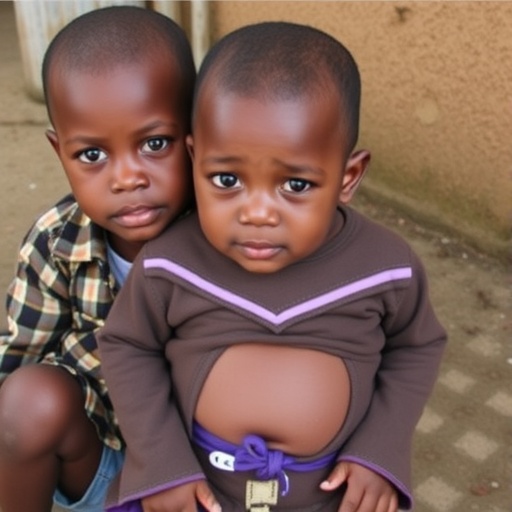In the depths of rural Southwestern Uganda, a troubling financial reality confronts families grappling with a rare congenital condition—anorectal malformations (ARMs) in children. These intricate congenital anomalies, involving malformations of the anus and rectum, carry not only profound medical challenges but also trigger devastating economic consequences for affected households. A groundbreaking study led by Oyania, Stephens, Ullrich, and colleagues, published in the International Journal for Equity in Health, meticulously unpacks the multilayered risk factors that propel families toward catastrophic healthcare expenditures.
This pioneering research illuminates how the interplay between clinical variables, sociodemographic elements, and systemic healthcare limitations coalesce into a perfect storm of economic hardship. The study’s fieldwork, deeply rooted in Southwestern Uganda, combines rigorous epidemiological rigor with compassionate inquiry. Its revelations provide unprecedented insight into the catastrophic fiscal toll exacted on families already burdened by the emotional weight of caring for children with complex anorectal defects.
The study identifies critical determinants that heighten the risk of catastrophic expenditure, defined as health-related spending that exceeds a substantial portion of household income, imperiling family welfare and long-term financial health. Central among these risk factors are delays in accessing specialized surgical care, prolonged hospitalization periods, and recurrent medical complications necessitating repeated interventions. Each of these factors amplifies direct medical costs, encompassing hospital fees, surgical expenditures, medications, and essential post-operative care.
Compounding the economic strain is the insidious impact of indirect costs often overlooked in healthcare cost assessments: transportation to distant health facilities, loss of income due to caregiver absenteeism, and ancillary expenses related to long-term follow-up and rehabilitation. In a region where subsistence farming predominates and cash flow is erratic, these hidden costs deepen the chasms of poverty and health inequity.
Another dimension revealed by the study is the inadequacy of health insurance coverage and social safety nets in shielding vulnerable populations from spiraling healthcare costs. In Southwestern Uganda, informal employment and economic precariousness preclude widespread insurance enrollment, leaving families exposed to the whims of unpredictable medical expenses. The research highlights the urgent need for policy innovation to expand financial risk protection mechanisms tailored to the socioeconomic realities of rural African communities.
Moreover, the researchers stress that these economic burdens perpetuate a vicious cycle, where impoverished families are forced to sell assets, incur debts, or forgo future healthcare needs, potentially exacerbating morbidity and mortality among affected children. This pattern underscores the crucial intersection between clinical outcomes and economic resilience, framing pediatric surgical care as not merely a health imperative but a social justice concern.
Innovative methodological approaches underpinned the study’s comprehensive evaluation of economic burdens. Utilizing both quantitative expenditure tracking and qualitative household interviews, the research team captured nuanced dimensions of financial sacrifice and coping strategies. This mixed-methods design enriches our understanding of how families navigate the labyrinth of costly, specialized pediatric surgical care amidst pervasive resource constraints.
The scientific rigor exhibited in defining and measuring “catastrophic health expenditure” advances the field’s precision in capturing the excess financial vulnerability triggered by specific surgical ailments. Such metrics pave the way for targeted interventions, facilitating evidence-based allocation of healthcare resources and social support tailored to high-risk populations.
Clinically, the study sheds light on anorectal malformations—conditions frequently necessitating staged surgical correction and lifelong follow-up—as a sentinel condition emblematic of broader challenges in pediatric surgical equity. The layered complexity of these cases demands multidisciplinary expertise, reinforcing calls for strengthening regional surgical infrastructure alongside economic supports.
Importantly, the research draws attention to the broader implications of pediatric surgical care integration within universal health coverage frameworks. As global health agendas increasingly prioritize equity and access, data-driven understanding of cost drivers and economic barriers becomes pivotal in designing inclusive health systems responsive to marginalized communities’ needs.
The findings resonate beyond Southwestern Uganda, offering transferable lessons for low- and middle-income countries confronting similar healthcare financing dilemmas. By dissecting the granular elements of economic burden specific to pediatric congenital anomalies, the study contributes critically to global dialogues on health financing reform, social protection, and health system resilience.
In conclusion, the investigative efforts by Oyania et al. illuminate an urgent, yet underappreciated, facet of health inequity—how congenital pediatric surgical conditions translate into catastrophic economic shocks for families in resource-limited settings. Their work calls for a paradigm shift that marries clinical excellence with economic justice, advocating for policies that safeguard vulnerable populations from financial ruin in the pursuit of essential surgical care. Addressing these intertwined dimensions is imperative to forge a path toward equitable pediatric healthcare access and sustainable health development in Uganda and beyond.
Subject of Research: Risk factors contributing to catastrophic healthcare expenditure and economic burden on families of children with anorectal malformations in Southwestern Uganda.
Article Title: Risk factors for catastrophic healthcare expenditure and high economic burden for children with anorectal malformations in Southwestern Uganda.
Article References:
Oyania, F., Stephens, C.Q., Ullrich, S. et al. Risk factors for catastrophic healthcare expenditure and high economic burden for children with anorectal malformations in Southwestern Uganda. Int J Equity Health 24, 321 (2025). https://doi.org/10.1186/s12939-025-02681-2
Image Credits: AI Generated




